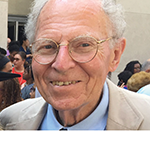“Rheumatologists are not famous for curing people – maybe making them feel better and even get better, but cure was something we could only aspire to and not actually achieve most of the time. I thought it would be thrilling to be able to cure a rheumatologic disease, namely Pompe syndrome,” says Dr. Plotz.
After taking an initial look at the mutations and altered proteins in the disease, Dr. Plotz became involved with gene therapy and created several mouse models of the disease, taking him deeper into the research. “The deepest place we have been drawn is into the area of the limit to the response to therapy,” he says. “The therapy that has been developed and approved is not fully satisfactory for the disease as it is in the skeletal muscles. We discovered phenomena that were consequences of the mutation that were unanticipated, quite unexpected, and therapeutically very challenging – not at all the problem that the therapy was designed to treat.”
Currently, Dr. Plotz and his team are exploring the basic problem that leads to this resistance to therapy. He finds this research difficult, yet exciting.
He’s come a long way from his days as a boy in Brooklyn, gaining both clinical and research knowledge along the way. Dr. Plotz will share his thoughts on the vocation of medicine with annual meeting attendees on Saturday, November 10 from 9:15–10:15 a.m. Attendees may even get a few stoopball tips.
